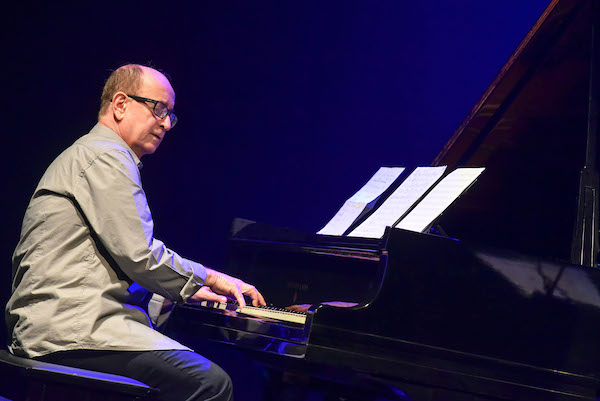Jan 13, 2026 2:09 PM
More Trump-Kennedy Center Cancellations
The fallout from the renaming of the John F. Kennedy Center for the Performing Arts to include President Donald…

Since they first met, pianist Antonio Adolfo has gone on to be one of the foremost bandleaders in Brazilian jazz, and Milton Nascimento became one of Brazil’s most essential and influential singers.
(Photo: Mirna Modolo)Although he reveres the highly sophisticated harmonies in Nascimento’s originals—“They say the music that comes from Minas is very rich in harmony because of the mountains,” Adolfo said—he didn’t hesitate to adapt them to his own jazzier intentions. “Other artists performing his songs don’t want to touch his harmonies; but I did, somewhat,” he continued.
Adolfo’s harmonic liberties with Milton’s songs are evident in the dense note clusters of his horn chorales for trumpet/flugelhorn, alto, tenor and trombone, for instance, on the ballads “Cais” and “Encontros E Despedidas.” He also alters the songs’ rhythmic forms, recasting the famous “Nada Será Como Antes” as a jazz shuffle and “Fe Cega, Faca Amolada” in the quadrilha style (a fast-paced version of a Brazilian square dance).
Adolfo has become something of a Brazilian jazz icon himself. As a young pianist and arranger, he studied with Eumir Deodato and Nadia Boulanger, and he’s written hits like “Sa Marina” (or “Pretty World,” with English lyrics by Alan and Marilyn Bergman), which has been covered by Stevie Wonder and Sergio Mendes. Calling on a regular group of about eight of the finest jazz players in Brazil, Adolfo’s recorded prolifically in recent years, collecting seven Grammy and Latin Grammy nominations since 2014. A noted educator, he runs his own school of Brazilian music since 1985, with three branches in Rio, and 1,300 students. He’s also published a dozen books and videos on Brazilian harmony and rhythm in both English and Portuguese.
BruMa almost didn’t happen because of the pandemic. “We started recording on March 15, as it turned out, the very last date we could do it,” he said. “The following week they closed all the studios. I wasn’t afraid; the studio was spacious. The separation of the instruments gave us confidence that it would be safe. Everyone is still healthy, thank God.”
Adolfo was never the cautious type, though. He was a pioneer of independent recording in Brazil, heading up his own label since the 1970s. “It’s the only way I can do it now. I like to do whatever comes to my mind ... even if it doesn’t sell. I’ve done about 10 albums myself, plus two albums [by my daughter, singer Carol Saboya], and two duo albums with Carol. They are doing well.”
Then there is occasional serendipity.
Last year, Adolfo was pleasantly surprised by an immaculately produced new cover of “Pretty World” by Sheléa, a Quincy Jones protégé, that featured Stevie Wonder on harmonica. Then there was his 1977 song, “Aonde Voce Vai,” the only song Adolfo sang on his indie debut, Feito Em Casa.
It was “a very simple song,” he said. “And, strangely enough, it was somehow discovered recently and used in the HBO series High Maintenance. And now it’s doing very well on Spotify.” DB

Belá Fleck during an interview with Fredrika Whitfield on CNN.
Jan 13, 2026 2:09 PM
The fallout from the renaming of the John F. Kennedy Center for the Performing Arts to include President Donald…

Peplowski first came to prominence in legacy swing bands, including the final iteration of the Benny Goodman Orchestra, before beginning a solo career in the late 1980s.
Feb 3, 2026 12:10 AM
Ken Peplowski, a clarinetist and tenor saxophonist who straddled the worlds of traditional and modern jazz, died Feb. 2…

The success of Oregon’s first album, 1971’s Music Of Another Present Era, allowed Towner to establish a solo career.
Jan 19, 2026 5:02 PM
Ralph Towner, a guitarist and composer who blended multiple genres, including jazz — and throughout them all remained…

Rico’s Anti-Microbial Instrument Swab
Jan 19, 2026 2:48 PM
With this year’s NAMM Show right around the corner, we can look forward to plenty of new and innovative instruments…

Richie Beirach was particularly renowned for his approach to chromatic harmony, which he used to improvise reharmonizations of originals and standards.
Jan 27, 2026 11:19 AM
Richie Beirach, a pianist and composer who channeled a knowledge of modern classical music into his jazz practice,…